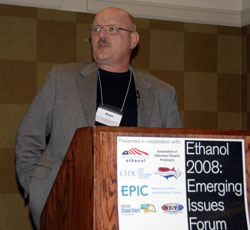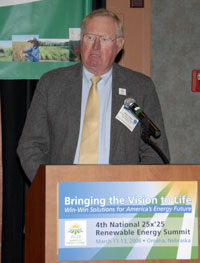 The town of Greenwich, Connecticut want to run about 150 of their 300 vehicles in the city’s fleet on biodiesel. Unsure how well that might actually work, officials decided to visit another New England town to see how their efforts had gone.
The town of Greenwich, Connecticut want to run about 150 of their 300 vehicles in the city’s fleet on biodiesel. Unsure how well that might actually work, officials decided to visit another New England town to see how their efforts had gone.
This story in the Greenwich (CT) Times has details:
[Elizabeth Linck, the town’s fleet director] and town Purchasing Director Joan Sullivan went last week to Keene, N.H., where the city has been using biodiesel for the past six years, to research the possible changeover.
“We wanted to see it in action,” Linck said. “When you do a project like this, you talk to the people who are doing it successfully.”
From fire trucks to public works vehicles, anything that runs on diesel in Keene’s city fleet uses the same soy-based blend being looked at by Greenwich. About 78 of the city’s 150 vehicles use biodiesel, which requires no special equipment.
Steve Russell, Keene’s fleet director, said the city was looking to cut down exposure to “eye piercing” and “lung piercing” emissions for its residents and employees.
“When you pull that car into that garage, it takes a while for those diesel fumes to go away,” Russell said. “My mechanics have noticed a major difference in the shop. It takes away the nasties.”
Keene is using soy-based B20, and Greenwich officials are considering the same after testing a 5 percent blend at first. While Keene officials say the biodiesel costs them more, they were able to get a state grant to help defray those costs. No word whether Connecticut offers such an incentive.


 An Oregon teenager has been honored for his work on making solar cells more efficiently.
An Oregon teenager has been honored for his work on making solar cells more efficiently. American biodiesel producers, who are trying to keep their heads above water in a market of rising feedstocks, might have found a way to keep their doors open: send their biodiesel to Europe.
American biodiesel producers, who are trying to keep their heads above water in a market of rising feedstocks, might have found a way to keep their doors open: send their biodiesel to Europe. Several race car drivers were on hand to pump gas and sign autographs including Joel Feinberg and Chris Hall both of Primetime Race Group racing the GT2 Team Dodge Viper Competition Coupe.
Several race car drivers were on hand to pump gas and sign autographs including Joel Feinberg and Chris Hall both of Primetime Race Group racing the GT2 Team Dodge Viper Competition Coupe.  The Wisconsin Public Service Corporation is looking to buy half interest of a Southeast Minnesota wind farm.
The Wisconsin Public Service Corporation is looking to buy half interest of a Southeast Minnesota wind farm. After announcing the formation of its Sustainability Task Force at the National Biodiesel Conference & Expo in Orlando, Florida last month, the group has filled out the nine-member panel.
After announcing the formation of its Sustainability Task Force at the National Biodiesel Conference & Expo in Orlando, Florida last month, the group has filled out the nine-member panel. “In order to develop best practices that will be adopted throughout our industry, we selected a task force that represents the various segments of the industry and regions of the country,” said Landsburg. “Recognizing the need for input from critical stakeholders who are not members of the NBB, such as environmental organizations, government entities, and sustainability advocates, we are forming an Advisory Committee that will be heavily involved in this process.”
“In order to develop best practices that will be adopted throughout our industry, we selected a task force that represents the various segments of the industry and regions of the country,” said Landsburg. “Recognizing the need for input from critical stakeholders who are not members of the NBB, such as environmental organizations, government entities, and sustainability advocates, we are forming an Advisory Committee that will be heavily involved in this process.” At today’s Ethanol 2008: Emerging Issues Forum one of the speakers was Dave Vander Griend, President/CEO
At today’s Ethanol 2008: Emerging Issues Forum one of the speakers was Dave Vander Griend, President/CEO  Referencing news stories about statements made by officials with Valero Energy and Pilgrim’s Pride, RFA President Bob Dinneen said, “To put the blame for rising commodity, food and energy prices solely at the feet of the American ethanol industry is misleading and diversionary. This kind of overheated, chicken little rhetoric is meant to distort the truth and deliberately misinform the American public.”
Referencing news stories about statements made by officials with Valero Energy and Pilgrim’s Pride, RFA President Bob Dinneen said, “To put the blame for rising commodity, food and energy prices solely at the feet of the American ethanol industry is misleading and diversionary. This kind of overheated, chicken little rhetoric is meant to distort the truth and deliberately misinform the American public.” Closing out the
Closing out the